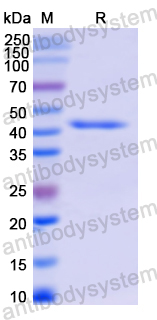Catalog No.
YHD29601
Expression system
E. coli
Species
Homo sapiens (Human)
Protein length
Ile17-Leu176
Predicted molecular weight
43.99 kDa
Nature
Recombinant
Endotoxin level
Please contact with the lab for this information.
Purity
>90% as determined by SDS-PAGE.
Accession
P18509
Applications
ELISA, Immunogen, SDS-PAGE, WB, Bioactivity testing in progress
Form
Lyophilized
Storage buffer
Lyophilized from a solution in PBS pH 7.4, 0.02% NLS, 1mM EDTA, 4% Trehalose, 1% Mannitol.
Reconstitution
Reconstitute in sterile water for a stock solution. A copy of datasheet will be provided with the products, please refer to it for details.
Shipping
In general, proteins are provided as lyophilized powder/frozen liquid. They are shipped out with dry ice/blue ice unless customers require otherwise.
Stability and Storage
Use a manual defrost freezer and avoid repeated freeze thaw cycles. Store at 2 to 8°C for frequent use. Store at -20 to -80°C for twelve months from the date of receipt.
Alternative Names
Pituitary adenylate cyclase-activating polypeptide, ADCYAP1, PACAP, PACAP-38, PACAP38, PACAP-27, PACAP27, PRP-48
Neuropeptide-mediated activation of astrocytes improves stress resilience in mice by modulating cortical neural synapses., PMID:39643639
Spinal pituitary adenylate cyclase-activating polypeptide and PAC1 receptor signaling system is involved in the oxaliplatin-induced acute cold allodynia in mice., PMID:39615811
Effects of PACAP Deficiency on Immune Dysfunction and Peyer's Patch Integrity in Adult Mice., PMID:39409005
Increased Expression of the Neuropeptides PACAP/VIP in the Brain of Mice with CNS Targeted Production of IL-6 Is Mediated in Part by Trans-Signalling., PMID:39273398
Opposing actions of co-released GABA and neurotensin on the activity of preoptic neurons and on body temperature., PMID:39207910
The association between dietary, physical activity and the DNA methylation of PPARGC1A, HLA-DQA1 and ADCY3 in pregnant women with gestational diabetes mellitus: a nest case-control study., PMID:39060963
Hippocampal PACAP signaling activation triggers a rapid antidepressant response., PMID:39044298
PACAP ameliorates obesity-induced insulin resistance through FAIM/Rictor/AKT axis., PMID:39041617
Expression of activity-regulated transcripts in pyramidal neurons across the cortical visuospatial working memory network in unaffected comparison individuals and individuals with schizophrenia., PMID:39033685
Oxytocin treatment rescues irritability-like behavior in Cc2d1a conditional knockout mice., PMID:39014123
PACAP-38 and sex hormones in women with migraine: exploratory analysis of a cross-sectional, matched cohort study., PMID:38858641
Neuroinflammation signatures in dorsal root ganglia following chronic constriction injury., PMID:38813203
Ventromedial hypothalamic nucleus subset stimulates tissue thermogenesis via preoptic area outputs., PMID:38729241
Association between social dominance hierarchy and PACAP expression in the extended amygdala, corticosterone, and behavior in C57BL/6 male mice., PMID:38637645
Pituitary Adenylate Cyclase-Activating Polypeptide (PACAP) of the Bed Nucleus of the Stria Terminalis Mediates Heavy Alcohol Drinking in Mice., PMID:38053471
PAC1 deficiency reduces chondrogenesis in atherosclerotic lesions of hypercholesterolemic ApoE-deficient mice., PMID:37980508
Birds of a feather flock together: a dataset for Clock and Adcyap1 genes from migration genetics studies., PMID:37945571
Pituitary Adenylate Cyclase-Activating Polypeptide (PACAP) and Sudden Infant Death Syndrome: A Potential Model for Investigation., PMID:37894743
Unveiling adcyap1 as a protective factor linking pain and nerve regeneration through single-cell RNA sequencing of rat dorsal root ganglion neurons., PMID:37880634
Dedifferentiated Schwann cells promote perineural invasion mediated by the PACAP paracrine signalling in cervical cancer., PMID:37830980
Protective effect of pituitary adenylate cyclase activating polypeptide in diabetic keratopathy., PMID:37775045
PACAP activates MRGPRX2 on meningeal mast cells to drive migraine-like pain., PMID:37516794
Downregulation of PACAP and the PAC1 Receptor in the Basal Ganglia, Substantia Nigra and Centrally Projecting Edinger-Westphal Nucleus in the Rotenone model of Parkinson's Disease., PMID:37511603
The gut-brain axis involved in polystyrene nanoplastics-induced neurotoxicity via reprogramming the circadian rhythm-related pathways., PMID:37392641
Increased pituitary adenylate cyclase-activating polypeptide in the central bed nucleus of the stria terminalis in mood disorders in men., PMID:37290577
Alterations in pituitary adenylate cyclase-activating polypeptide in major depressive disorder, bipolar disorder, and comorbid depression in Alzheimer's disease in the human hypothalamus and prefrontal cortex., PMID:37226771
Integrated analysis of the lncRNA-associated ceRNA network in Alzheimer's disease., PMID:37187245
Genome-wide association study of SNP- and gene-based approaches to identify susceptibility candidates for lupus nephritis in the Han Chinese population., PMID:36275661
Brainstem ADCYAP1+ neurons control multiple aspects of sickness behaviour., PMID:36071158
Mental health and the effects on methylation of stress-related genes in front-line versus other health care professionals during the second wave of COVID-19 pandemic: an Italian pilot study., PMID:36001138
PACAP-PAC1R modulates fear extinction via the ventromedial hypothalamus., PMID:35902577
Effects of Cyclosporine A and Adalimumab on the expression profiles histaminergic system-associated genes and microRNAs regulating these genes in HaCaT cells., PMID:35899934
Plasma Proteins as Occupational Hazard Risk Monitors for Populations Working in Harsh Environments: A Mendelian Randomization Study., PMID:35602164
The PV2 cluster of parvalbumin neurons in the murine periaqueductal gray: connections and gene expression., PMID:35486186
PACAP-expressing neurons in the lateral habenula diminish negative emotional valence., PMID:35304804
The Anxiolytic Drug Buspirone Prevents Rotenone-Induced Toxicity in a Mouse Model of Parkinson's Disease., PMID:35163768
Metformin Treatment Attenuates Brain Inflammation and Rescues PACAP/VIP Neuropeptide Alterations in Mice Fed a High-Fat Diet., PMID:34948457
Gene Expression Data Mining Reveals the Involvement of GPR55 and Its Endogenous Ligands in Immune Response, Cancer, and Differentiation., PMID:34948125
At the heart of the interoception network: Influence of the parasubthalamic nucleus on autonomic functions and motivated behaviors., PMID:34856204
Genome-wide differentially methylated genes associated with posttraumatic stress disorder and longitudinal change in methylation in rape survivors., PMID:34799556
PACAP-PAC1 Signaling Regulates Serotonin 2A Receptor Internalization., PMID:34759890
Relationships between constitutive and acute gene regulation, and physiological and behavioral responses, mediated by the neuropeptide PACAP., PMID:34741979
Adenylate cyclase-activating polypeptide 1 gene methylation predicts prognosis and the immune microenvironment of bladder cancer., PMID:34709747
Significance of serum VIP and PACAP in multiple sclerosis: an exploratory case-control study., PMID:34698942
PACAP and VIP Modulate LPS-Induced Microglial Activation and Trigger Distinct Phenotypic Changes in Murine BV2 Microglial Cells., PMID:34681607
Targeted deletion of PAC1 receptors in retinal neurons enhances neuron loss and axonopathy in a model of multiple sclerosis and optic neuritis., PMID:34610465
Frequent lineage-specific substitution rate changes support an episodic model for protein evolution., PMID:34542594
Examination of CA1 Hippocampal DNA Methylation as a Mechanism for Closing of Estrogen's Critical Window., PMID:34421577
Molecular changes associated with migratory departure from wintering areas in obligate songbird migrants., PMID:34105726
Molecular signaling pathways underlying schizophrenia., PMID:34010744

